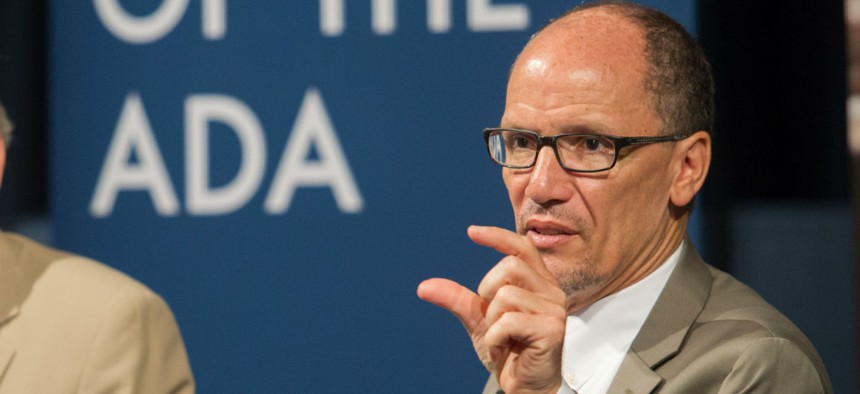
Secretary of Labor Thomas Perez hosts a panel discussion highlighting the Americans with Disabilities Act in July. Labor Department file photo
Obama Plan to Curb Unfair Labor Practices Draws Industry Fire
Contractors warn of “blacklisting” while transparency group hails improved practices.
A proposed rule aimed at curbing contractors’ unfair or inefficient labor practices has drawn objections from major contractors and a qualified thumbs-up from a nonprofit advocate of government transparency.
In late May, the Labor and Defense departments, along with the General Services Administration and NASA, jointly proposed rules and guidance for amending the Federal Acquisition Regulation to “improve contractor compliance with labor laws and increase efficiency and cost savings in federal contracting.”
President Obama’s July 2014 executive order—which could affect 28 million workers at 24,000 companies—required prospective and existing contractors to disclose past labor violations so contracting officers could consider the information, in consultation with labor compliance advisors, before awarding a contract.
“To achieve paycheck transparency for workers,” the proposal noted, the executive order would require “contractors and subcontractors to provide individuals with information each pay period regarding how they are paid and to provide notice to those workers whom they treat as independent contractors.”
When the proposed rule was issued in May, Labor Secretary Thomas Perez said, “The opportunity to contract with the federal government is a privilege not a right.” The goal is to “ensure that contractors’ employees are given necessary information to make sure their paychecks are accurate,” he said. It is also to “ensure that workers who may have had their civil rights violated or been sexually assaulted can have their day in court, ending pre-dispute mandatory arbitration agreements covering these claims at large federal contractors.”
Perez said the agencies were “guided by extensive outreach to contractors, worker advocates and many others” in crafting the proposed rule.
Last week, the Arlington, Va.-based Professional Services Council joined with five associations to submit highly negative comments on the proposal, which they likened to blacklisting. “The sweeping and significant new compliance regime established by the proposals does not align with the president’s own recognition that the vast majority of contractors already play by the rules,” said council President and CEO Stan Soloway, who joined with the Council of Defense and Space Industry Associations.
“These proposals will stifle responsible, well-intentioned contractors with a heavy blanket of new reporting and compliance requirements, much of which can already be achieved using current government oversight and data,” Soloway said in a statement. “At the same time, the proposals lay waste to the very concept of due process.”
The industry groups argue that the government failed to show that existing labor law enforcement, including suspension and debarment, are insufficient. The new mandates “will discourage new entrants and drive innovative companies out of the federal market,” the council said. They also will “strip contractors of their due process rights by allowing punishments based on mere allegations” and shift subcontractor oversight from the Labor Department to prime contractors, the council said.
A more upbeat view was submitted a day earlier by the nonprofit Project on Government Oversight, which noted that some companies with records of poor integrity, ethics and labor law compliance “provide bad value for the government and taxpayers.”
But POGO would have the government go further. “We are concerned that various restrictions and omissions concerning contractor disclosure—for example, contractors are not required to report criminal violations, settled cases, or violations of foreign labor laws—could diminish the overall effectiveness of the EO,” wrote investigator Neil Gordon. “We hope that our suggestions are incorporated into the final rule.







